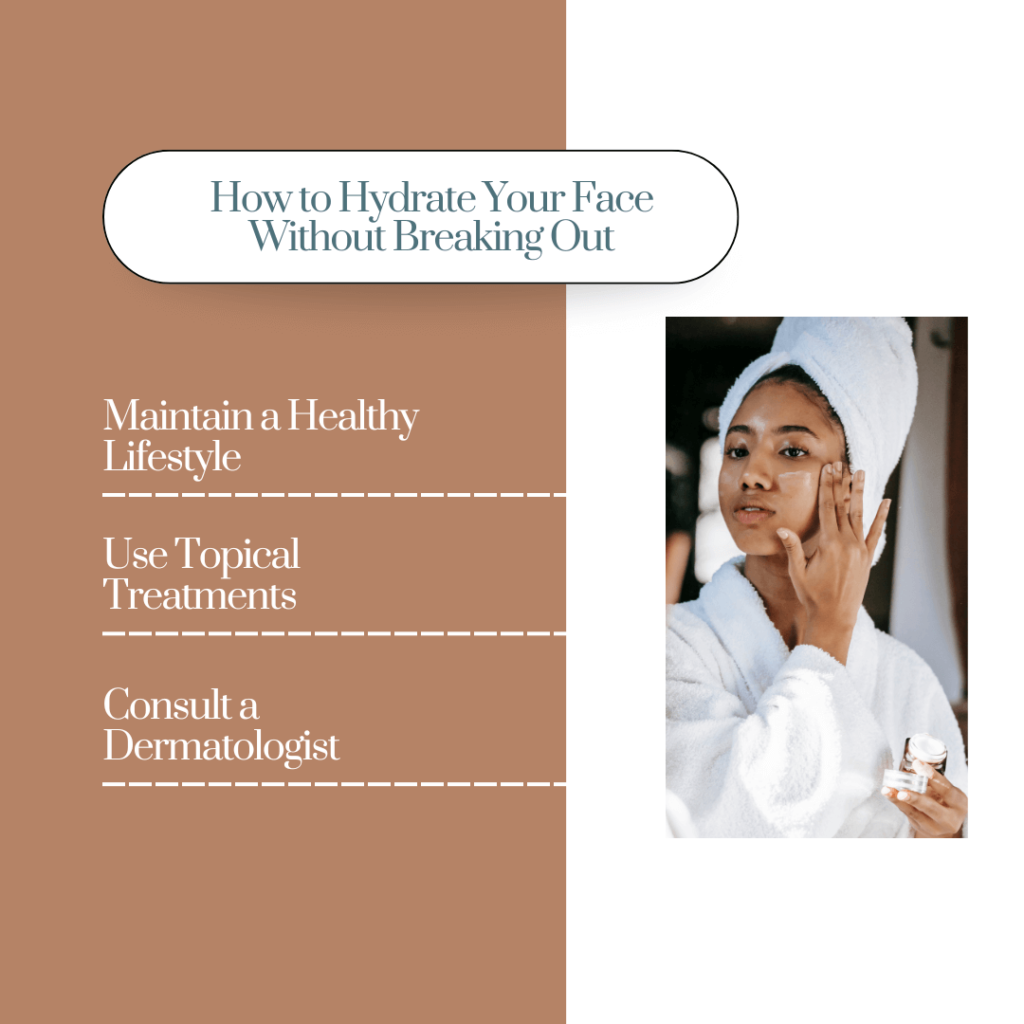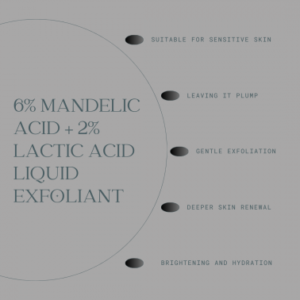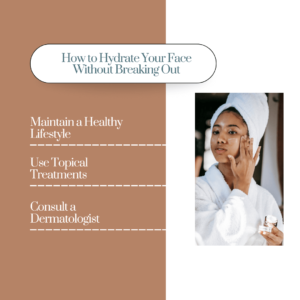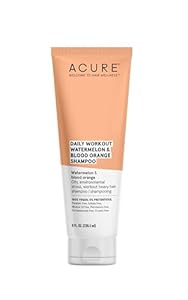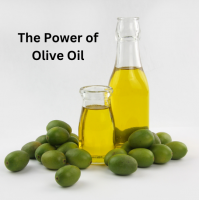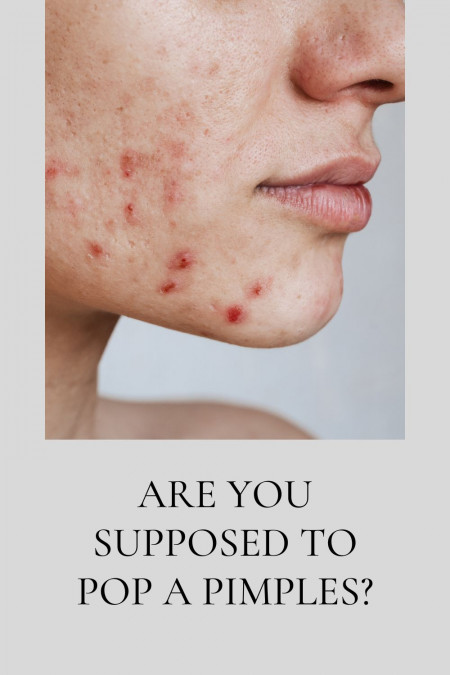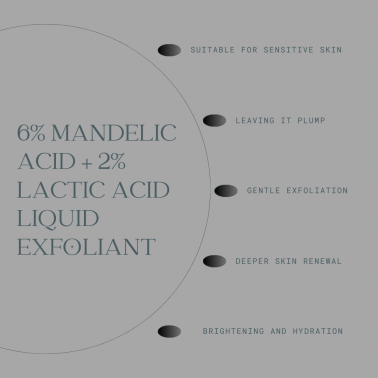Hydration is crucial for maintaining healthy, glowing skin, but if you have acne-prone or sensitive skin, the quest for moisture can feel daunting. Fortunately, there are effective ways to hydrate your face without risking breakouts.
In this post, we’ll explore how to hydrate your skin from the inside out, identify signs of dehydrated skin, and share the best practices for achieving well-hydrated skin.
Table of Contents
ToggleUnderstanding Dehydrated Skin
First, let’s discuss the signs of dehydrated skin. You might notice dryness, tightness, dullness, or fine lines, especially on your forehead. Dehydrated skin can also feel rough or flaky, with patches that seem resistant to moisturizers. This condition differs from having very dry skin; while dehydrated skin lacks water, dry skin lacks oil.
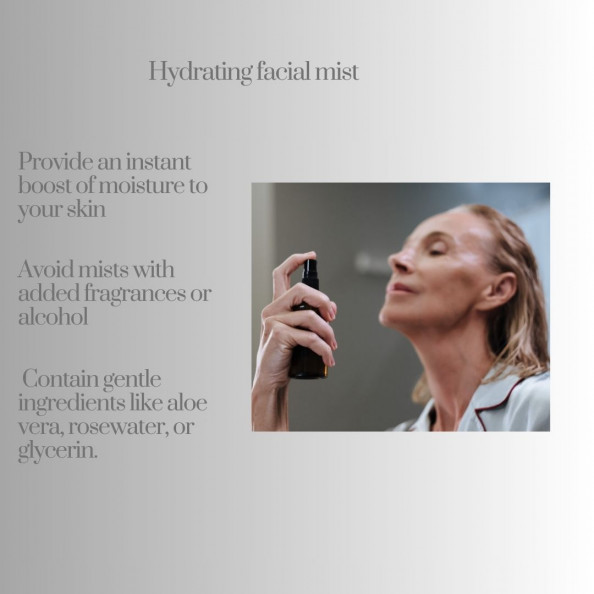
Best Ways to Hydrate Your Face Without Breaking Out
Choose the Right Moisturizer
Opt for a deep moisturizer for the face that provides moisture without clogging pores. Look for non-comedogenic products that include ingredients like hyaluronic acid, glycerin, and aloe vera, which can draw moisture into the skin and lock it in. An ultra-hydrating moisturizer works wonders for those with normal to dry skin types.
Use a Gentle Cleanser
A gentle cleanser will help you avoid stripping your skin of its natural oils. Hot showers can exacerbate dryness, so try to wash your face with lukewarm water instead. After washing, gently pat your face dry to avoid removing too much moisture.
Incorporate Hydrating Ingredients
Look for moisture skincare products that contain beneficial ingredients. Moisturizer water, face sprays, and serums packed with hydrating elements can help improve your skin’s moisture barrier. Be wary of heavy oils that might lead to breakouts; instead, focus on lightweight options.
Hydrate Skin Overnight
Nighttime is the perfect time to restore moisture. Using a moisturizing skincare routine that includes a hydrating serum followed by a thick cream can help your skin absorb moisture while you sleep. This approach is especially effective for treating dry skin internally, as your skin can repair itself overnight.
Stay Hydrated Internally
To truly moisturize your skin from the inside out, drink plenty of water throughout the day. Foods high in water content, such as cucumbers, watermelon, and oranges, can also help maintain hydration levels.
Avoid Over-Exfoliating
Exfoliating too frequently can strip your skin of moisture, leading to dryness and irritation. Instead, aim for a gentle exfoliation routine that helps remove dead skin cells without disrupting your skin’s natural moisture barrier.
Consider a Hydration Treatment
For quick results, you might want to explore a skin hydration treatment. Treatments like moisture masks or professional facials can provide an instant boost of moisture and help your skin feel rejuvenated.
Use Epsom Salt with Caution
While Epsom salt is often used for its soothing properties, it’s important to note that it can also dry out your skin if used excessively. If you choose to use it, make sure to follow up with a good moisturizer to lock in moisture.
Quick Fixes for Dehydrated Skin
If you need to fix dehydrated skin fast, consider using a face spray throughout the day. This is especially helpful in dry environments or during seasonal changes.
Incorporate these habits into your daily skincare routine, and you’ll notice a significant improvement. Your skin will thank you for it!
Natural Aging and Skin Dehydration in 30 and 60
The age of 30 and 60 of a woman’s skin is changing very fast. Their skin hair and body change every month. Science says that is a hormonal change in her body change them. So the skin transforms into dehydrated if her skincare routine is not fine.
In the 30s, changes often relate to fluctuations in estrogen and progesterone, affecting skin elasticity, moisture, and oil production. In the 60s, menopause leads to a decrease in estrogen, which can cause dryness, thinning skin, and increased wrinkles.
Skin retains in your 30s moisture better than in later decades, but signs of dehydration can start to appear. Collagen production begins to slow, and you may notice fine lines and a loss of radiance.
It’s important to maintain hydration through a good skincare routine. Using moisturizers with hyaluronic acid or glycerin can help keep the skin plump and hydrated.
In Your 60s skin tends to become significantly drier due to a marked decrease in oil production and moisture retention. The skin’s barrier function weakens, leading to increased dryness, sensitivity, and the appearance of fine lines.
Emphasis on moisture becomes crucial. Using richer creams and incorporating hydrating serums can make a substantial difference. Regularly using sunscreen and gentle exfoliation can also help maintain a healthy appearance.
What is Dehydrated Skin Naturally?
Water retention skin is naturally directed to skin that lacks sufficient water content, not oil. This condition can affect all skin types, including oily skin. Elements that contribute to natural dehydration include climate, diet, lifestyle, and hormonal changes.
Signs of Naturally Dehydrated Skin
Signs of natural Water retention skin feels tight after cleansing or exposure to the elements.
A lack of natural radiance and Dullness.
A big sign of visibility of fine lines around the forehead, eyes, and lips.
Sometimes it appears as patches of rough or flaky.
Before and After: Dehydrated vs. Hydrated Skin
Before and After: Dehydrated vs. Hydrated Skin” illustrates the difference in skin appearance and health before and after proper hydration.
Before (Dehydrated Skin):
- Appearance: Dull, rough, or flaky texture; fine lines may be more noticeable; skin can look tight or even have dry patches.
- Feel: Often feels dry or tight, lacking suppleness.
- Signs: May experience redness or irritation, especially if the skin is sensitive.
After (Hydrated Skin):
- Appearance: Plump, smooth, and radiant; skin looks more even-toned and healthy; fine lines may be less noticeable.
- Feel: Soft, supple, and elastic; generally feels comfortable and nourished.
- Signs: A healthier glow, reduced dryness, and fewer visible signs of irritation.
Good Hydration for All Skin Types:
- Normal Skin: when you see normal hydrated skin appears balanced and radiant without excessive oiliness or dryness.
- Dry Skin: Well-hydrated skin feels comfortable, with fewer tight or flaky areas.
- Oily Skin: Even oily skin benefits from hydration; hydrated skin can help balance oil production, preventing excessive shine.
- Combination Skin: Hydration can help maintain balance, ensuring that dry areas feel nourished while oily zones remain controlled.
Acne and water
Can You Absorb Water Through Your Skin? Drinking a good amount of water helps keep your body and skin hydrated. Well-hydrated skin is less prone to clogging and can maintain its natural elasticity. Water also supports the transport of essential nutrients to the skin cells, promoting overall skin health.
Drinking water doesn’t directly affect oil production in the skin. However, staying hydrated can help balance your body’s natural processes, including sebum production. When your body is adequately hydrated, it can regulate oil production more efficiently, potentially reducing excess oiliness that could contribute to acne breakouts.
Here’s how water can affect acne:
Hydration
Detoxification
Oil Control
Cleansing
Bathing and Showering
Washing your face with water helps remove dirt, bacteria, and dead skin cells that can accumulate and clog your pores.
Regularly bathing or showering with clean water helps keep your body and skin clean. It removes sweat, dirt, and other impurities that can accumulate on your skin and potentially contribute to acne.
5 Miraculous Benefits of Water for Acne-prone Skin
Glowing Skincare Routine for Day and Night
Conclusion
Achieving Water retention skin is a journey that involves both internal and external practices. By focusing on how to hydrate your skin naturally, you can maintain a balance that promotes healthy, radiant skin without the fear of breakouts. Remember to pay attention to your skin type and adjust your routine as needed, and you’ll be well on your way to achieving your hydration goals!

